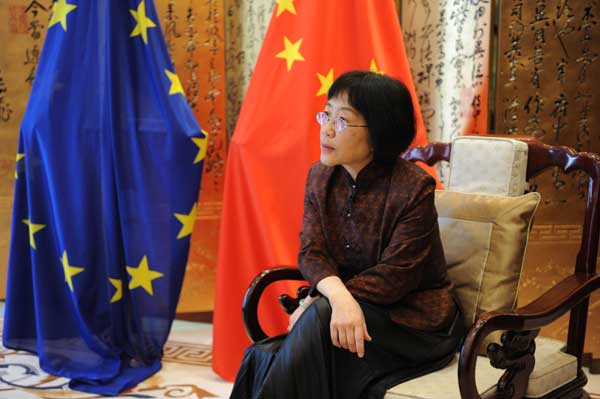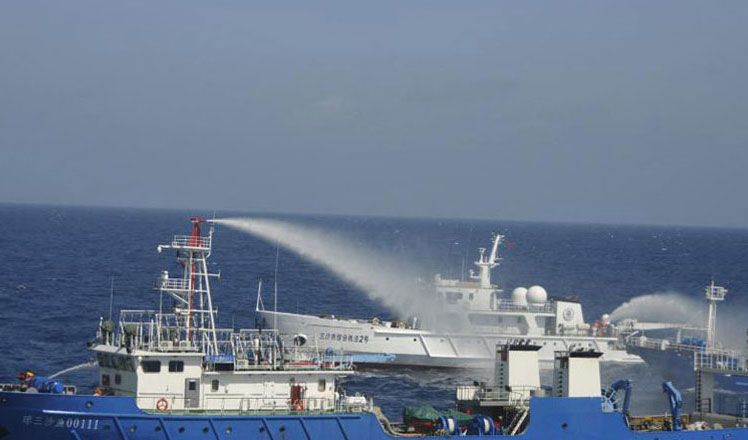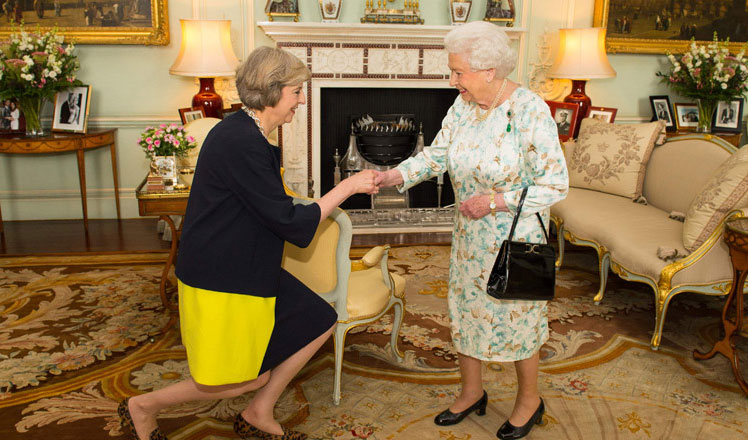The South China Sea Arbitration: Illegal, Illegitimate and Invalid
Updated: 2016-07-12 16:42
By Yang Yanyi(chinadaily.com.cn)
|
||||||||
 |
|
Ambassador Yang Yanyi, Head of the Chinese Mission to the EU |
If I have to choose three words to reflect my views of the award of arbitration over the South China Sea disputes unilaterally filed by the Philippines against China, it would be illegal, illegitimate and invalid. And China's position is firm and clear: non-acceptance.
Not surprisingly, some in the West have again pointed their fingers at China and accused China of "thumbing nose at international rules".
I cannot but dismiss these allegations and vilifications as groundless and unjustified. It is the Philippines and some other forces that are acting against international law. China is not.
1. Although the Philippines has struggled to appear that it is only requesting the Arbitral Tribunal to decide on the legal status of some features in the South China Sea, it failed to cover up the essence of it is about territorial sovereignty and maritime delimitation. Nor can it hide its obvious purpose of denying China's sovereignty over Nansha Islands and emboldening its illegal occupation from China.
It is common knowledge that territorial issues are subject to general international law, rather than the United Nations Convention on the Law of the Sea (the UNCLOS/the Convention), and that disputes concerning maritime delimitation are excluded by China in its 2006 declaration on optional exceptions on Article 298 of UNCLOS.
Mr. Chris Whomersley, former Deputy Legal Adviser of the UK's Foreign and Commonwealth Office, made a good point when he said there was "no precedent for an international tribunal deciding upon the status of a maritime feature when the sovereignty… is disputed". Simply put, the Philippines' initiation of the arbitration is in total disregard of international law and the spirit of UNCLOS, and undermines the authority and sanctity of the Convention.
2. Settlement of territorial sovereignty dispute through bilateral negotiations is an established international practice and in full compliance with the principles and spirit of the UN Charter.
If memory serves me correctly, China and the Philippines were the first countries in the region that agreed to resolve the relevant disputes through negotiations.
In June 1986, during his meeting with Jose P. Laurel, Vice-President and Minister of Foreign Affairs of the Philippines, Mr. Deng Xiaoping put forward the principle of shelving disputes and seeking joint development. This was well received by the Philippine side. China and the Philippines later entered into a number of agreements announcing the option of bilateral negotiations to resolve the relevant disputes.
- South China Sea Issue ABC: Challenges for the DOC implementation and the COC consultation
- Lies of Philippines' Aquino administration on South China Sea
- Why will China never respect US over South China Sea?
- Infographics: Xi's remarks on the South China Sea issue
- Timeline of the South China Sea arbitration case
- Arbitration tribunal has no jurisdiction over South China Sea issue: HK law expert
- 8-year-old boy gains 11kg to save father
- China rebuts claim it sank Vietnamese fishing boat
- China on high alert as floods kill 237
- What I want is a healthy grandson, so I will try anything I can
- China calls on US, Japan to stop twisting the facts
- Girl suffers sibling rivalry disorder after younger brother's birth
- African Union opens with launch of continental passport
- Baton Rouge shooter identified as ex-Marine Gavin Long
- Navy chiefs set for fresh talks on South China Sea
- Arrests hit 6,000 as Turkey cracks down on army and judges after coup bid
- A close look at Theresa May's new cabinet
- More than 70 dead in Nice attack as France marks national day

 Ten photos from around China: July 8-14
Ten photos from around China: July 8-14
 The only surviving panda triplets weaned from milk
The only surviving panda triplets weaned from milk
 First sea-air emergency drill held near Sansha
First sea-air emergency drill held near Sansha
 Truck attack in Nice as France marks national day
Truck attack in Nice as France marks national day
 Picture Chinese stories: 10 illustration books you can't miss
Picture Chinese stories: 10 illustration books you can't miss
 Theresa May: New Iron Lady in Downing Street
Theresa May: New Iron Lady in Downing Street
 Large amount of sea grass besieges Qingdao
Large amount of sea grass besieges Qingdao
 Monks seek tranquility inside lotus ponds
Monks seek tranquility inside lotus ponds
Most Viewed
Editor's Picks

|

|

|

|

|

|
Today's Top News
Ministry slams US-Korean THAAD deployment
Two police officers shot at protest in Dallas
Abe's blame game reveals his policies failing to get results
Ending wildlife trafficking must be policy priority in Asia
Effects of supply-side reform take time to be seen
Chinese State Councilor Yang Jiechi to meet Kerry
Chinese stocks surge on back of MSCI rumors
Liang avoids jail in shooting death
US Weekly

|

|







